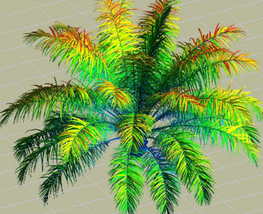PalmStudio
Project description
The project aims at building an innovative modelling tool to support agronomic decisions for the optimization of the productivity of oil palm plantations. We propose a modelling suite called PalmStudio to simulate individual plant growth and production using an explicit 3D representation that grows and produce in interaction with its environment. Specifically, the model account for the effects of climate, soil, planting design, genetic material and N fertilisation to predict changes in phenology, growth and bunch yield. The project focus on the prediction accuracy to get a modelling tool able to explore: 1) the effect of future extreme climatic conditions (heat wave, drought, low radiation, elevation in CO2) on production and; 2) optimized planting design in interaction with the genetic variability in architectural and physiological responses to the environment.
Funding
SMART research institute (Indonesia)
Duration
3 years (01/06/21 – 31/05/24). This is the second phase of the project (first phase 2017 - 2019)
Website
MaCS4Plants people involved
- Raphaël Perez
- Rémi Vezy
- Thomas Arsouze
MaCS4Plants deliverables
In this project, Raphaël Perez and Rémi Vezy are co-PI of the project. We are commited to build a Functional-Structural Plant Model (FSPM) for the oil palm (Elaeis guineensis) to predict yield considering genotypic, management, and environmental factors.
The PalmStudio model will simulate the effect of the architectural development, planting design, climate, and soil on the biophysical processes (e.g. light interception, transpiration, leaf temperature), the carbon allocation, and in-fine the production of the oil palm. Considering these objectives, the model considers a 3D representation of the architecture of the palm trees on which the effect of progeny (e.g. genetic inheritance in morphological and physiological traits), planting design (e.g. inter-individual competition for light or water), and management (e.g. pruning, fertilization) can be tested.

